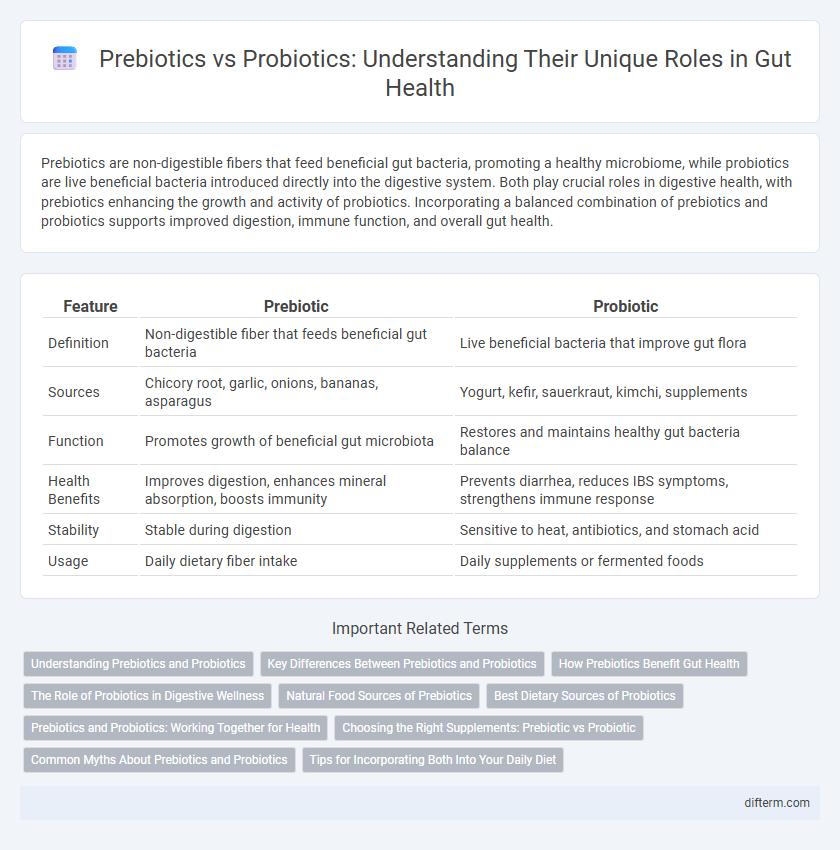Prebiotics are non-digestible fibers that feed beneficial gut bacteria, promoting a healthy microbiome, while probiotics are live beneficial bacteria introduced directly into the digestive system. Both play crucial roles in digestive health, with prebiotics enhancing the growth and activity of probiotics. Incorporating a balanced combination of prebiotics and probiotics supports improved digestion, immune function, and overall gut health.
Table of Comparison
| Feature | Prebiotic | Probiotic |
|---|---|---|
| Definition | Non-digestible fiber that feeds beneficial gut bacteria | Live beneficial bacteria that improve gut flora |
| Sources | Chicory root, garlic, onions, bananas, asparagus | Yogurt, kefir, sauerkraut, kimchi, supplements |
| Function | Promotes growth of beneficial gut microbiota | Restores and maintains healthy gut bacteria balance |
| Health Benefits | Improves digestion, enhances mineral absorption, boosts immunity | Prevents diarrhea, reduces IBS symptoms, strengthens immune response |
| Stability | Stable during digestion | Sensitive to heat, antibiotics, and stomach acid |
| Usage | Daily dietary fiber intake | Daily supplements or fermented foods |
Understanding Prebiotics and Probiotics
Prebiotics are nondigestible fibers that nourish beneficial gut bacteria, promoting a healthy microbiome and improving digestion. Probiotics consist of live beneficial bacteria that directly enhance gut flora balance and support immune function. Together, prebiotics and probiotics play complementary roles in maintaining digestive health and preventing gastrointestinal disorders.
Key Differences Between Prebiotics and Probiotics
Prebiotics are non-digestible fibers that serve as food for beneficial gut bacteria, enhancing their growth and activity. Probiotics are live microorganisms, such as Lactobacillus and Bifidobacterium strains, that directly add to the population of healthy bacteria in the digestive system. While prebiotics improve the gut environment by nourishing existing microbes, probiotics introduce new strains to restore or maintain microbial balance.
How Prebiotics Benefit Gut Health
Prebiotics are non-digestible fibers that serve as food for beneficial gut bacteria, promoting their growth and activity. This stimulation enhances the production of short-chain fatty acids like butyrate, which strengthens the intestinal barrier and reduces inflammation. Consuming prebiotic-rich foods such as garlic, onions, and bananas supports a balanced microbiome and improves overall digestive health.
The Role of Probiotics in Digestive Wellness
Probiotics play a crucial role in maintaining digestive wellness by enhancing the balance of beneficial gut bacteria such as Lactobacillus and Bifidobacterium species. These live microorganisms aid in improving digestion, reducing symptoms of irritable bowel syndrome (IBS), and boosting the immune response within the gastrointestinal tract. Regular consumption of probiotic-rich foods like yogurt, kefir, and fermented vegetables supports gut health, nutrient absorption, and overall digestive function.
Natural Food Sources of Prebiotics
Natural food sources of prebiotics include chicory root, garlic, onions, leeks, asparagus, bananas, and whole grains such as barley and oats. These foods contain non-digestible fibers like inulin and fructooligosaccharides that stimulate the growth of beneficial gut bacteria. Incorporating prebiotic-rich foods supports digestive health and enhances the effectiveness of probiotics by creating a favorable environment for their proliferation.
Best Dietary Sources of Probiotics
Fermented foods such as yogurt, kefir, sauerkraut, kimchi, and miso are among the best dietary sources of probiotics, offering beneficial live bacteria that support gut health. These foods contain strains like Lactobacillus and Bifidobacterium, which help maintain a balanced microbiome and improve digestion. Consuming a variety of probiotic-rich foods regularly can enhance immune function and reduce gastrointestinal issues.
Prebiotics and Probiotics: Working Together for Health
Prebiotics are non-digestible fibers that nourish beneficial gut bacteria, enhancing the growth and activity of probiotics, which are live beneficial microorganisms. Together, prebiotics and probiotics create a balanced gut microbiome, supporting digestion, immune function, and overall health. Their synergistic relationship, often referred to as synbiotics, improves nutrient absorption and reduces inflammation in the gastrointestinal tract.
Choosing the Right Supplements: Prebiotic vs Probiotic
Choosing the right supplements involves understanding that prebiotics are non-digestible fibers that promote the growth of beneficial gut bacteria, while probiotics are live bacteria that add directly to the existing microbiome. For individuals with digestive issues, combining prebiotic fibers such as inulin or fructooligosaccharides with probiotic strains like Lactobacillus and Bifidobacterium can enhance gut health and immune function. Personalized selection based on specific health goals, strain specificity, and digestive tolerance ensures maximum efficacy of prebiotic and probiotic supplements.
Common Myths About Prebiotics and Probiotics
Common myths about prebiotics and probiotics often confuse their distinct functions; prebiotics are non-digestible fibers that feed beneficial gut bacteria, while probiotics are live bacteria that add to the gut microbiome. Many believe probiotics always colonize the gut permanently, but most exert temporary effects and require continuous intake to maintain benefits. Another misconception is that prebiotics and probiotics have interchangeable effects, yet scientific research shows they operate synergistically but serve different roles in promoting digestive health.
Tips for Incorporating Both Into Your Daily Diet
Incorporate prebiotic-rich foods such as garlic, onions, and bananas alongside probiotic sources like yogurt, kefir, and fermented vegetables to foster a balanced gut microbiome. Aim to include a variety of both in meals by adding prebiotic fibers to smoothies or salads and consuming probiotics with breakfast or snacks. Consistent daily intake of diverse prebiotic and probiotic foods supports digestive health, immune function, and nutrient absorption.
Prebiotic vs Probiotic Infographic

 difterm.com
difterm.com